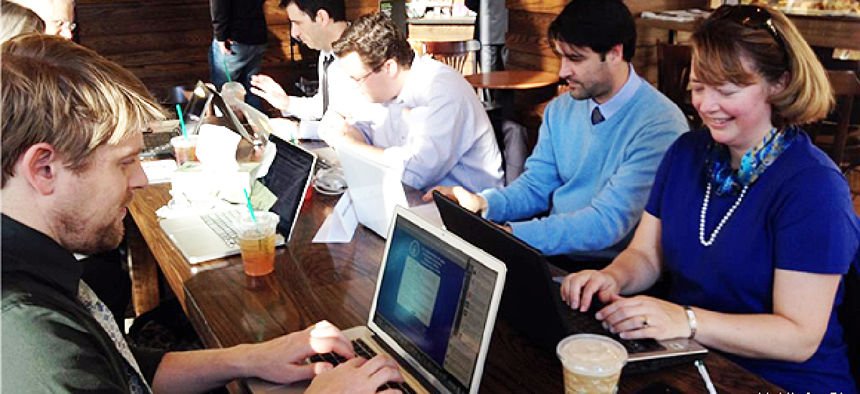Mobile Gov Wikithon: Where the rubber meets the code


Connecting state and local government leaders
Monthly sessions of volunteers help expand the Mobile Gov Wiki, a go-to resource for best practices on mobile government.
Agencies looking for best practices on mobile learning or device management, or finding what trends are affecting mobile platforms, have a go-to resource in the Mobile Gov Blog, a by-the-people, for-the-people exchange on mobile government (with the people, in this case, being federal employees and contractors).
The blog was created by the General Services Administration’s Office of Citizen Services and Innovative Technologies (OCSIT) to help agencies develop mobile services.
A little over a year ago, Jacob Parcell, manager of Mobile Programs at OCSIT’s Digital Services Innovation Center, decided to take it a step further, gathering all of the ideas, methods and knowledge of the blog together into the Mobile Gov Wiki.
The idea was to create a repository of all the information an agency would need on almost any mobile-related subject. And although it always will be a work in progress, like any wiki, it already has accumulated more than 300 pages, graphics and supporting documents. There are more than 120 contributing members who represent many different government agencies and private-sector firms.
To keep members current on changes to the wiki and to get them to directly help and give advice to one another, Parcell has organized monthly Mobile Gov Wikithons. Usually scheduled at public spaces such as a local coffee shop, these sessions focus on areas of the wiki that need the most work. In addition, people who attend can often get real help on a current project or dilemma from others who have likely already been there.
Parcell and a few of his staff members recently held a wikithon in a fairly spacious Starbucks in downtown Washington. They had reserved a conference- size table in anticipation of a large turnout, and they weren’t wrong. Soon after the scheduled start time, members and potential members wandered in, filling the table as well as some other spaces besides.
The organizations represented were as varied as their current mobile needs. Someone working on the Health and Human Service’s Department’s AIDS.gov was trying to optimize his mobile website. Another from the Agriculture Department was looking into best practices for a new mobile newsletter. An employee of DMI Inc. was looking for ways government and business can collaborate.
Someone from Hewlett-Packard on a contract supporting the Housing and Urban Development Department was there to get ideas on developing more mobile capabilities, as well as to network. Meanwhile, a Census Bureau leader, who was actually passing through to get coffee, stuck his head in to ask some questions about improvements to the agency’s APIs. Considering that the Census Bureau’s APIs are setting the standard for such things, his interest shows the value of the Mobile Gov Wiki.
One feature of the wikithon is the “cookie jar.” This is a jar filled with slips of paper. Each piece contains the name of one of the wiki pages and a job having to do with that page. Some can be quite simple, although time consuming: “Android, Open Source, Accessibility Applications - Remove the <span> tags from source code.”
Others involve some fact-checking: “Gesture Recognition -Verify MEanderthal uses gesture recognition as the video defines it.” There are a few, however, that would take quite a bit of work: “Mobile Devices - Since this has been re-titled from ‘Phones’ to ‘Mobile Devices,’ it needs more devices such as laptops, e-readers, gaming devices, GPS as those connect with more and more data, and a mention/link of Web 3.0.”
Pretty much every person who attended grabbed at least one of these slips and got to work between discussions about their agency’s mobile solutions.
To make it a bit more fun for the contributors, the Mobile Gov staff offers badges for certain achievements. Every time participants edit an existing page, create a new one or attend a wikithon, they might earn a badge that will be shown along their name in the Wiki Badge Hall of Fame. It’s a way for Parcell and his co-workers to thank the members for all their hard, otherwise uncompensated work.
I left the coffee shop with half of the contributors typing away, and the other half actively engaged in discussion about mobile development. The Mobile Gov Wiki is already a good resource for mobile issues, but if the members keep up this level of activity, they will likely accomplish a lot more down the road.
Want to share your success stories or expertise with other agencies that may be going through the same thing? Just join up as a member of the Mobile Gov Wiki and start contributing. And soon you’ll be able to hang out in a coffee shop somewhere, probably learning something new.

NEXT STORY: Defense personnel can now take meetings on their Apple devices





